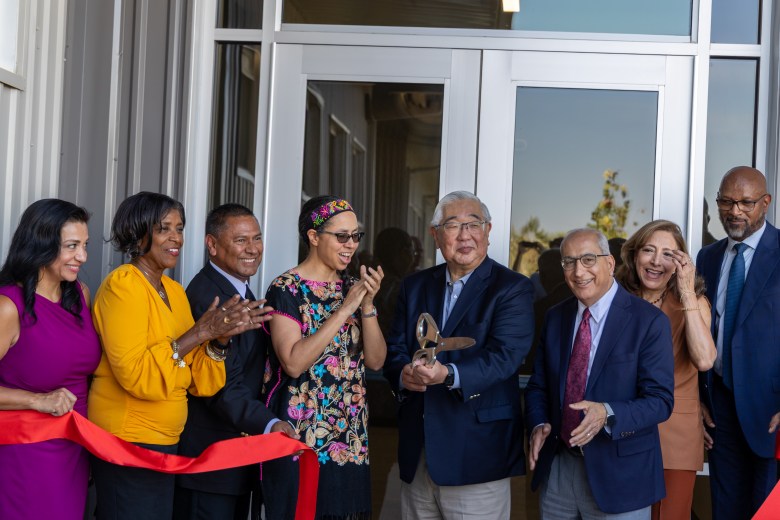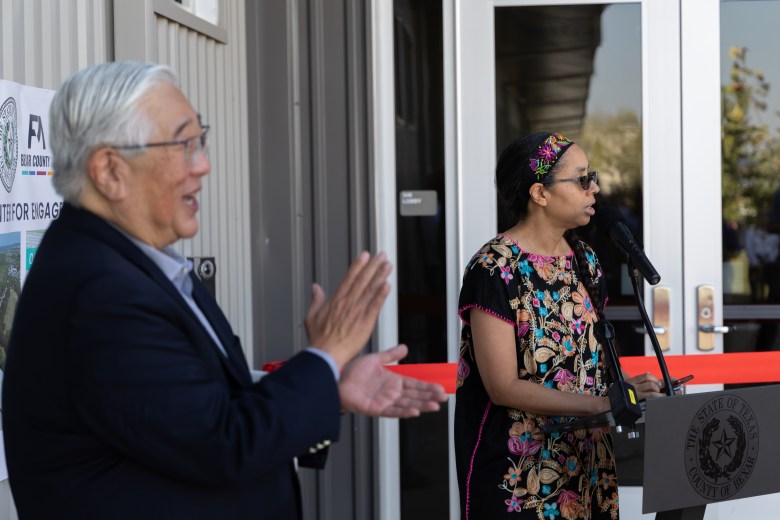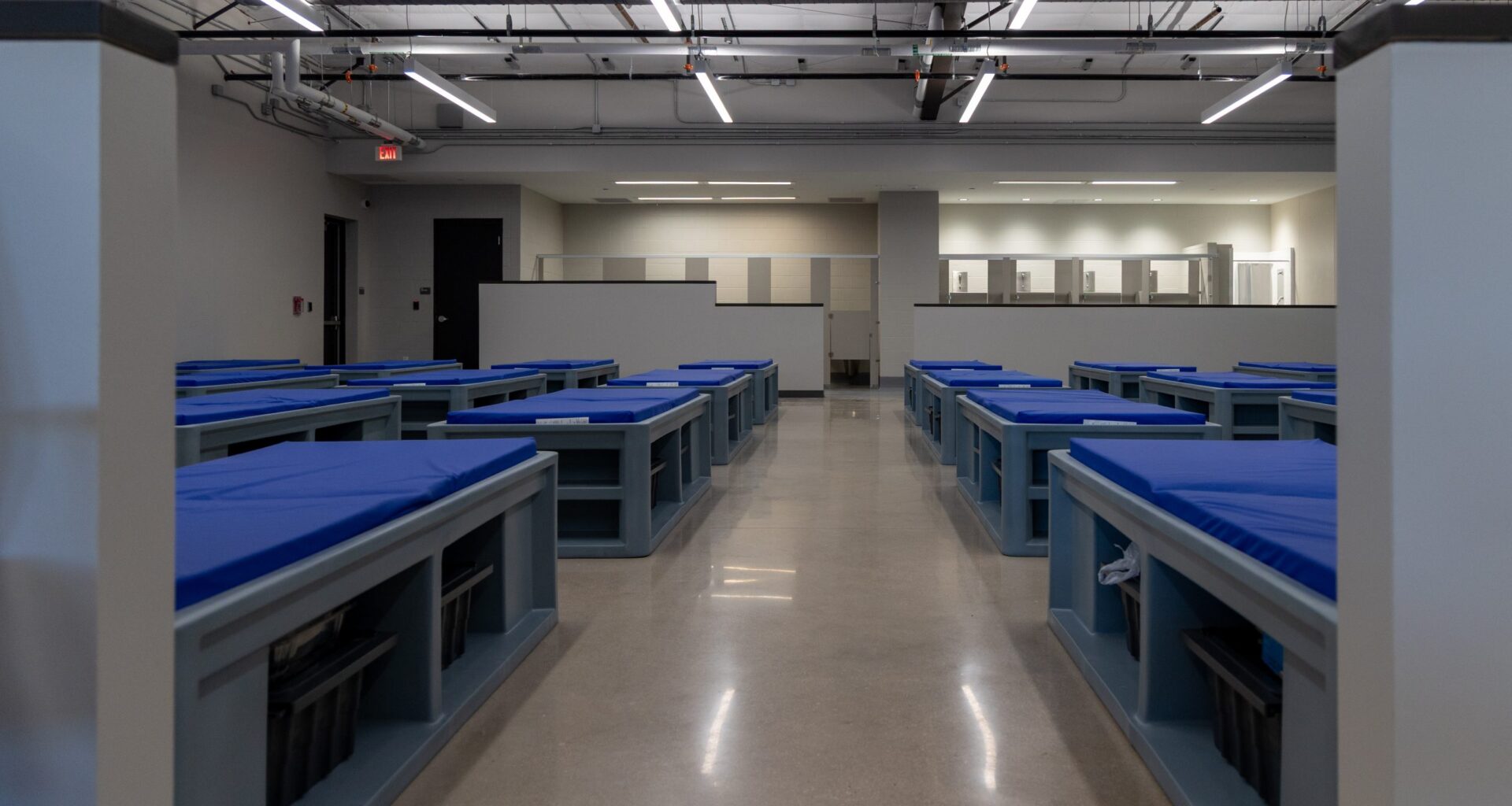A new expansion to Bexar County’s Applewhite Recovery Center opened Thursday on the South Side, adding 130 beds to the county’s only residential campus dedicated to treating people with both mental illness and substance use disorders.
Commissioner Rebeca Clay-Flores, who represents Precinct 1, where the facility sits, called the $28 million an investment “in people, families and in our entire community.”
She said the project is a critical step toward addressing behavioral-health needs in the county.
“Far too often, individuals in our justice system are dealing with mental illness, and many times they go back into jail again and again and become repeat offenders,” Clay-Flores said. “ This facility gives probationers struggling with schizophrenia, bipolar disorder, and major mood disorders the chance to heal, stabilize and succeed.”
The Applewhite campus has long served as one of the county’s few treatment alternatives to jail, housing court-ordered clients for rehabilitation under the Community Supervision and Corrections Department.
The Commissioners Court advanced plans to renovate the facility after purchasing the land in 2023 using federal American Rescue Plan Act or ARPA dollars, which was meant to stabilize the economy post COVID-19 pandemic.
 County Judge Peter Sakai and Precinct 1 Commissioner Rebeca Clay-Flores cut the ribbon to mark the opening of the new expansion at the Applewhite Recovery Center on the South Side on Thursday. Credit: Diego Medel / San Antonio Report
County Judge Peter Sakai and Precinct 1 Commissioner Rebeca Clay-Flores cut the ribbon to mark the opening of the new expansion at the Applewhite Recovery Center on the South Side on Thursday. Credit: Diego Medel / San Antonio Report
Construction began last fall. The site includes three specialized residential units — a Substance Abuse Treatment Facility for addiction recovery, a transitional offender program for clients nearing community reentry, and the Dual-Diagnosis Residential Program (DDRP) unit for individuals managing both mental health and substance use disorders.
The new expansion primarily increases capacity for the dual diagnosis program, operated in partnership between the Texas Correctional Office on Offenders with Medical and Mental Impairments and the Center for Health Care Services. The program provides mental health and substance use treatment to probationers living with co-occurring disorders, serving as a secure, court-ordered alternative to incarceration.
Its goal is to help clients achieve stability, maintain sobriety and reintegrate as productive members of the community, said Orion Wirick, clinical administrator for CHCS, in a statement.
Jarvis Anderson, chief probation officer and director of the county department, said Applewhite is one of only three dual-diagnosis residential programs of its kind in Texas and accepts clients from across the state through the criminal justice system. There are similar facilities in Dallas and Harris counties.
The Applewhite campus previously had space for about 300 residents; the new addition increases overall capacity to roughly 430. Anderson said the single-occupancy beds in the expansion can be reconfigured to accommodate up to 260 people if demand rises, using bunk-style setups.
 Bexar County Community Supervision and Corrections Director Jarvis Anderson gives a speech at the opening ceremony for the new expansion at the Applewhite Recovery Center on the South Side on Thursday. Credit: Diego Medel / San Antonio Report
Bexar County Community Supervision and Corrections Director Jarvis Anderson gives a speech at the opening ceremony for the new expansion at the Applewhite Recovery Center on the South Side on Thursday. Credit: Diego Medel / San Antonio Report
The new space will begin admitting residents within the next month. About 75 people are waiting in the Bexar County Jail for placement in the DDRP program, he said.
“It’s gonna take some time,” Anderson said. “The curriculum is 120 to 180 days. We can reduce that term or increase that term. We offer outpatient programs before they get here and offer outpatient programs after they leave.”
That before-and-after care is part of the department’s holistic approach to rehabilitation, focused on providing continuity of care rather than one-time intervention. Participants who need additional support can return to the program without restarting the intake process, a model that Anderson described as essential for long-term recovery.
Bexar County Judge Peter Sakai said the expansion reflects a broader shift in how the county approaches mental health and justice by emphasizing rehabilitation over incarceration.
“In a restorative justice model for which I’m committed to as a county judge, you first got to get ’em clean and sober. Two is, you got to deal with mental health issues, especially if it’s a trauma informed issue,” Sakai said. “What we’ve learned is, once we get them on this path of stability, this path of sobriety, then they can become productive citizens.”
While the facility focuses on helping individuals achieve stability and sobriety, Sakai said a broader benefit is reduction of overcrowding in the county’s jail system — where many inmates struggle with the same issues the program is designed to address.
“We need to get those people in jail out of jail that are sitting there, especially low-level offenders and people that are unhoused, we need to move them out of our jails and into other facilities,” he said.
Bexar County Sheriff Javier Salazar said the new facility could help ease the strain on jail space while providing appropriate treatment to those in need.
“It is well established that there are a number of people within our jail population who are only here for want of more appropriate options, such as mental health beds or addiction treatment programs,” Salazar said in a statement. “Although I don’t yet know how many people this facility will impact, anything we can do to make more appropriate use of our jail space will help.”
 Bexar County Judge Peter Sakai claps as Precinct 1 Commissioner Rebeca Clay-Flores speaks at the opening of the new expansion at the Applewhite Recovery Center on the South Side on Thursday. Credit: Diego Medel / San Antonio Report
Bexar County Judge Peter Sakai claps as Precinct 1 Commissioner Rebeca Clay-Flores speaks at the opening of the new expansion at the Applewhite Recovery Center on the South Side on Thursday. Credit: Diego Medel / San Antonio Report
Clay-Flores said she hopes the expansion marks the beginning of a broader, long-term investment in mental health infrastructure. The county, she said, still faces waiting lists for treatment beds and limited space for long-term residential care.
“This is a great beginning, but we need to continue to fight,” she said. “There continues to be people rotting in jail. Those people aren’t just those people — they’re someone’s child, someone’s sister, someone’s husband.”
Clay-Flores said she plans to continue pushing for additional mental health beds and similar facilities across the county.
“In the state of Texas, our jails are the number one provider of mental health services, which is utterly ridiculous,” she said. “We need more facilities like this, and we need more mental health beds, and I continue to fight for more beds. That’s something I have been saying from day one, and it’s something I’m going to continue to do until I retire, which is no time soon.”

